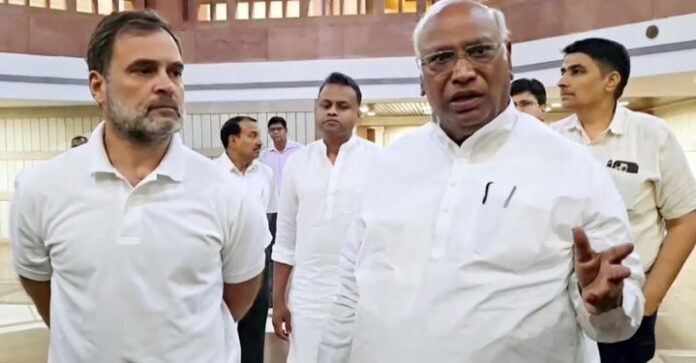In a strong response to the Pahalgam terror attack that shook the nation on April 22, 2025, Congress President Mallikarjun Kharge has demanded a special session of Parliament to deliberate on the deteriorating security situation in Jammu and Kashmir. The attack, which left 26 people dead and over a dozen injured, has drawn criticism from across the political spectrum, but Congress’s leadership has been especially vocal in holding the central government accountable.
Kharge, addressing a press conference at the AICC headquarters in New Delhi, stated, “The country has once again been pushed into mourning. The Pahalgam attack is not just an act of terror; it is a glaring failure of the intelligence and security apparatus under this government. We demand a special Parliament session to discuss how such an attack could occur despite repeated assurances of peace in Kashmir.”
The Congress president further questioned the Modi government’s claims over the restoration of normalcy in the Union Territory, saying that repeated violent incidents expose a stark contrast between rhetoric and reality. “Just a few months ago, we heard the Prime Minister boast of peace and progress in Jammu and Kashmir. How can we reconcile those statements with what happened in Pahalgam?” he asked.
The Attack and Its Aftermath
The attack in Baisaran Valley, a popular tourist site near Pahalgam, was executed by five militants reportedly affiliated with the Lashkar-e-Taiba (LeT). Armed with automatic rifles and grenades, they ambushed a group of tourists, deliberately targeting individuals after reportedly asking for religious identification. Among the deceased were 25 Indian nationals and a Nepalese citizen. The brutality of the assault and its communal overtones have sent shockwaves throughout the country.
Security forces launched a manhunt in the region, killing two of the attackers within 24 hours. However, the incident has raised serious concerns about how such a group could infiltrate and plan such a coordinated attack in an area considered secure.
Political Fallout
The political fallout was immediate. Congress, supported by several opposition parties, intensified its criticism of the government’s Kashmir policy, alleging that it had prioritized optics over real security reforms. “We need clarity on the current security strategy. There has been a communication breakdown between local enforcement, central forces, and intelligence agencies,” Kharge said.
Trinamool Congress, DMK, and Aam Aadmi Party have backed Congress’s call for a Parliament session, emphasizing the need for transparency, accountability, and national unity in times of crisis.
Home Minister Amit Shah responded by saying that the government was “doing everything possible” to secure the region and had “intensified counter-terror operations.” He dismissed allegations of intelligence failure and criticized the opposition for politicizing a national tragedy.
Demand for Accountability and Policy Reassessment
Kharge emphasized that the special session should not be a symbolic gesture but must serve as a platform for concrete policy discussion. He proposed the following agenda for the session:
- A detailed briefing from the Home Ministry and intelligence agencies.
- An independent inquiry into the intelligence lapses, if any.
- A review of the current military and counter-insurgency deployment in Kashmir.
- Stronger border surveillance and infiltration prevention mechanisms.
- A parliamentary resolution condemning the attack and supporting victims’ families.
He also called for a national-level bipartisan committee on internal security, asserting that counter-terror strategies should not be bound by political cycles. “Terrorism is not just a security issue; it’s a national threat that requires political consensus and continuity of approach,” Kharge added.
Ground Realities in Jammu and Kashmir
Despite the removal of Article 370 and the government’s push for economic and political reintegration of Jammu and Kashmir, the region continues to face intermittent violence. The government has been promoting tourism and private investment as signs of development, but incidents like the Pahalgam attack bring underlying vulnerabilities to the forefront.
A senior security analyst, speaking anonymously, said, “There’s a push-pull situation. The increased civilian movement and tourism in Kashmir are being countered by militants who see this normalization as a threat. The Pahalgam attack was both symbolic and strategic.”
Local residents expressed outrage over the attack but also voiced fears of increased militarization in the region. “We want peace, but peace cannot come from security force numbers alone. There needs to be dialogue and trust-building,” said Abdul Rashid, a local shopkeeper in Anantnag.
National Reaction and Global Condemnation
The Prime Minister condemned the attack and assured justice for the victims. “India will not forgive this bloodshed. The perpetrators and those behind them will face the full force of the law,” Modi said in a televised address. He also spoke with the Jammu and Kashmir Lieutenant Governor and reviewed the situation with the Cabinet Committee on Security.
Several world leaders, including those from the United States, France, and the United Arab Emirates, issued strong statements condemning the attack and expressing solidarity with India. UN Secretary-General António Guterres called the attack “a cowardly act of terrorism” and called for those responsible to be brought to justice.
Moving Forward
The Pahalgam attack has reignited old debates: Is Kashmir truly on the path to peace? Are India’s internal security systems keeping pace with emerging threats? Can political unity override ideological rifts in times of crisis?
Kharge’s demand for a special session is not merely political theatre—it reflects the urgency of a national dialogue on terrorism, security, and governance. As the political temperature rises and the country mourns its dead, the call for accountability grows louder.
Whether or not the Modi government agrees to the special session, the attack has placed internal security and Kashmir policy back at the heart of national discourse. Citizens, lawmakers, and security experts will all be watching closely—looking not just for answers, but for action.

